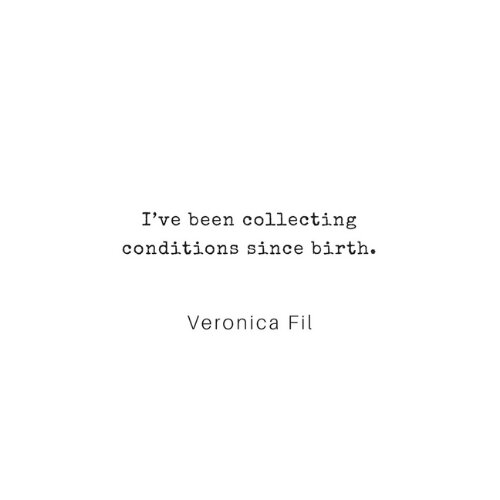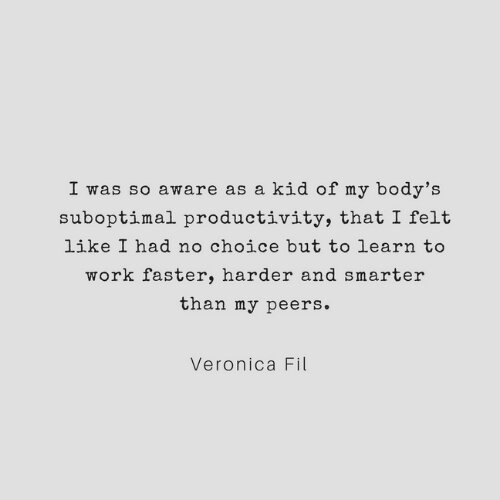A Chronic Entrepreneur: Veronica Fil
Veronica Fil has a no bullshit approach to life, health, work, love and everything in between. When discussing chronic illness with Veronica, in her words, she’s been ‘collecting conditions since birth’ – among them the overarching Mixed Connective Tissue Disorder, as well as Type 1 Diabetes, Lupus and Narcolepsy. Doctors advised her she wouldn’t live a long life, which is why she takes on life with everything she has. She lives life on her own terms – determined to achieve and succeed in how she defines success. She’s the co-owner of Lûmé Restaurant with her partner, who’s also the Executive Chef, and she also works as the Head of Marketing at Mr Harry’s Marketing. Discover her story below.
What’s your Chronic?
Mixed Connective Tissue Disorder (T1 Diabetes, Lupus, Narcolepsy, occasional death).
Where/when were you diagnosed?
I’ve been collecting conditions since birth.
What does being an entrepreneur mean to you?
Simply put, I like to call myself an Ideas Man.
What came first, the chronic or the entrepreneurism?
I think you’re born with both. But I have a theory on this.
I recognised a while back that a lot of the people who I admire in the world of entrepreneurship display a similar set of character traits: insane drive for success, type A personalities, high anxiety levels, insomnia…things that our society commonly considers to be disorders. But I’m kind of proud of those qualities — they’re largely responsible for my success!
Funnily, people who have this collection of traits also happen to be the ones who are frequently diagnosed with autoimmune disorders. Perhaps these things are more intrinsically linked than we realise.
How did this path come to you?
Lack of alternative option. When I was younger I was always worried that I wouldn’t be able to work in a proper job as my condition progressed. Doctors didn’t help to alleviate that fear — in fact, the very clear message they continually reaffirmed was that I was “too sick to work”. Which was a fat load of bullshit really because I did it anyway and I’m fine.
I was so aware as a kid of my body’s suboptimal productivity, that I felt like I had no choice but to learn to work faster, harder and smarter than my peers. Otherwise I would’ve never been able to compete. Ultimately it was that disadvantage that turned into my secret weapon, because while everyone else was off taking gap years and partying, I was straight into business, trying to make as much money as I could as fast as I could.
I needed money now, I figured. Not in 40 years — at which point, if I believed doctors, I’d be dead anyway, right?
Did you go through any sort of 12-stages of grief with the diagnosis or take it in its stride? How did the process manifest itself? Did you immediately reassess your life?
No. And to be completely honest I have a low tolerance for anybody selfish enough to focus on their struggle. But I also appreciate that for those who have enjoyed their health all their lives until everything crashes down, they’ve had no experience leading up to that point. And in trying to process what it all means, their health becomes a label and the focus of their entire world.
My advice to anyone who’s experiencing a major health scare or diagnosis is to spend a few nights in a hospital. You’ll find people there who are a lot worse off than you, and a lot braver than you, every single time. Many of them don’t make it home again. If you do make it home, you’re winning in my book.
Did you seek out or join organisations representing your chronic for support or did you find comfort and answers elsewhere? What would you recommend in hindsight?
It’s natural to seek out the company of those who are in similar situations to ourselves. But I take zero comfort in pouring over any aspects of my life that involve pain or discomfort. I prefer to surround myself with hellishly driven people who inspire me and excite me.
I don’t get a lot of time to focus on the bad stuff when I’m busy building another business. It’s the quiet times that are more of a concern. That’s when you have too much time to dwell and think and allow anxiety to seep in.
How have you changed, if at all, in your relationships, decisions and values?
I always thought that as my health deteriorated further, I’d become more empathetic of others. Instead, the opposite has occurred. I’ve become increasingly intolerant of anyone who talks about their struggles or uses their setbacks as an excuse to not achieve more. It’s boring. Life is hard — use your setbacks as power-ups and you’ll be unstoppable.
What is your life philosophy and has this changed?
You can’t fail if you haven’t stopped trying yet.
What do you wish you’d known before?
What it’s like to die. Seriously. To feel your body slip away in an emergency room while clinically-coated bodies swarm around you. It’s like those moments of semi-lucidity before you go to sleep.
Or…I wish that I’d have lost everything earlier in life. Everything recalibrates when you lose your health, all your friends or your ability to walk. I regained the latter but it certainly changed my priorities in life. I really don’t care anymore about whether I’ve left the house without makeup (because I have a face!) or the fact that I can’t afford those gorgeous shoes I wanted (whatever — at least I have feet that can walk!).
Once these things are stripped away from you — these things we all take for granted — your worst fears are realised. And then what? Then you’ve been there, done that and there’s nothing left to fear anymore. You’ve tackled that. You’re still here. And that’s a very liberating place to reach.
Are you on any treatments? Why/why not?
As an economist I can’t help but recognise the sheer opportunity cost of research into my condition. In terms of the general population, the incidence of MCTD is just too rare to justify major investments into research (compared to more widespread conditions such as Type 2 Diabetes or Breast Cancer).
There’s no specialist clinics in Australia that focus on the condition; it’s a matter of going to whichever doctor deals with the specific issue I’m having that day (some days it’s a dodgy lung or a malfunctioning heart; others it’s arthritis or some bizarre, unattractive rash that I swear is not an STI). Sadly, that means there is no preventative care available either — it’s all very ad hoc.
There’s specialists and even clinics overseas where this condition is being researched. What drives me in business is the need to make enough money to get to those places and people. It’s an effective motivating factor.
What advice do you have for others starting out on this journey?
You’ll lose a bunch of friends. Try not to get stuck on this; people often don’t know how to deal with yucky emotions and they might even take them out on you. Ignore it. Hang out with them when they make you feel good, and when they don’t make you feel good, you’re under no obligation to pick up the phone. The sooner you can ditch your expectations of others the happier you’ll be.
What is a ‘bad day’ for you?
A day when my body packs in and I physically don’t get to the places I need to be. That’s the most frustrating thing for me because the brain is still working, but the body just isn’t keeping up. I’ve been known to have the odd frustrated tanty.
What do you do on a ‘bad day’?
Wail for a bit. Exercise, if I can. Call a customer service line and complain about my latest electricity/water/phone bill. Cry. Then realise that nobody is listening/cares and that I may as well salvage the day.
There’s always something I can be doing. If I can’t get into the office, I’ll video conference with the team. If I’m in hospital I’ll set up my laptop and iPad on the bed and plug in my headset, effectively making myself look like an absolute dickhead. If I’m too crook to talk or think, I’ll read, listen to a podcast or work on some mindless admin.
How do you deal with stress?
Cooking. I find something extremely satisfying about the process of chopping vegetables.
I also find that watching a few minutes of Netflix at night helps me wind back my thoughts from the savage, swirling mass of ideas that they are. Something ridiculous and trashy like Riverdale does the trick quite nicely.
What do you struggle with the most?
For a long time, especially when I was still very concerned that I’d be less ‘employable’ due to my complete inability to work normal hours, I struggled with recognition. I still do. But I’ve since realised that this has never come from others — only myself doubting my own abilities, or still slipping into that tired mindset that I’ll never be able to compete with everyone else.
What are you most proud of?
The day it clicked to me that there was nothing left to fear, but also everything to fear at the same time. Pretty much anything could happen at any moment. When you’re comfortable resigning yourself to that idea, and simply make the most of everything you’ve got in that moment, the world becomes a hell of a lot more fun.
Who are your back up dancers?
I’d really like an all-male strip revue who followed me around everywhere to punctuate my sentences with occasional backup dancing, sound effects and optional security services.
Are you a 5-year planner or are you winging it?
I’ve never understood people who set out a five year plan then methodically go about executing it. Things change so rapidly — especially in the digital age, and even more so when you live a lifestyle like this. My goal is to be as ridiculously successful as possible, and to never, ever settle for an existence that’s anything less than extraordinary. Whatever route I need to take to get there, that’s what I do.
Dream weekend plans and have these changed?
Wine, food and business strategy. I get very excited by these things working in conjunction, which is probably why I’m drawn to the restaurant industry.
Ultimate dinner party guests?
I’m obsessed with meeting new people and learning about how they live. Whoever they are, it doesn’t matter. I crave information. Helps if they’re bringing food too. Those people are always welcome to my parties.
What advice would you give your younger self?
There’s a lot of things in life that you’re going to be shit at. Conversely, there’s a few things that you’re going to be amazing at. Way better than other people at, even. You should stick to those things and hire others to do the rest.
What’s next?
Lûmé Los Angeles in late 2018.
How can people find you?
Mr Harry’s Marketing Department exists as a result of my need to create a work environment and career built around my troublesome health. It’s also the result of a very smart and generous investor (Mr Harry himself) who believed in what I could do—albeit the fact that I work in very non-traditional ways.
My partner and I also have a rather unusual fine dining restaurant in Melbourne called Lûmé (www.restaurantlume.com), where he’s the Executive Chef. He told me from the first time I met him that nothing about my health could ever phase him. I didn’t believe him at the time—and man I’ve put that to the test—but turns out it was true. He’s my hero.
Let us know what you think below and share your story with us on Instagram tagging @achronicentrepreneur and using the hashtag #achronicentrepreneur.



















